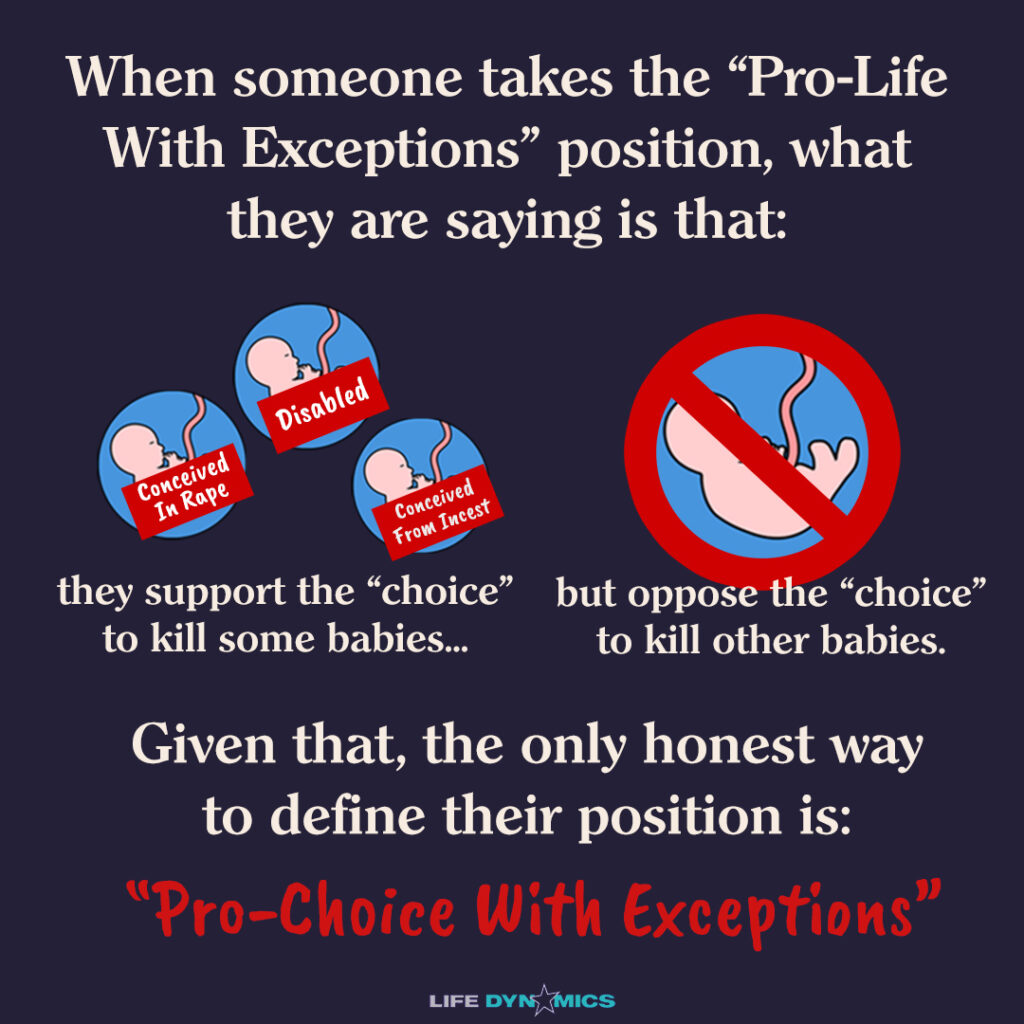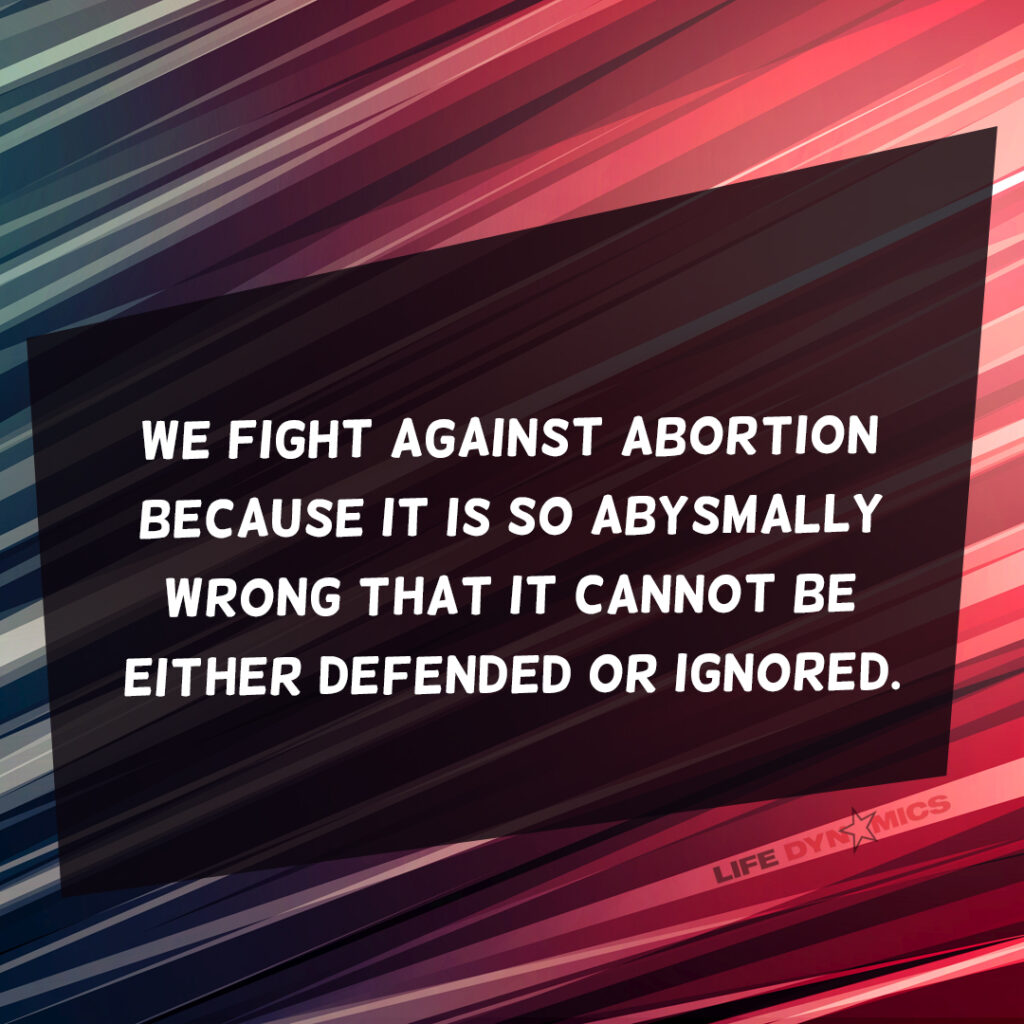Averting A Pro-Life Disaster
No one can be an effective advocate for the unborn without a complete understanding of the fundamental principle guiding the pro-life position. We also need to prevent an important dispute within our movement from derailing all our efforts.

No one can be an effective advocate for the unborn without a complete understanding of the fundamental principle guiding the pro-life position.
The good news is, it’s actually an easy concept to understand.
The term “Pro-Life” is founded on the acknowledgment of the biological reality that (a) human life begins at the moment a woman’s egg is fertilized by a man’s sperm, and that (b) every human being is entitled to have his or her life protected by law from that moment forward.
Regrettably, the pro-life position is often compromised or watered-down for political expediency or in a misguided effort to appear “reasonable.” You’ll hear people say that they are pro-life but that there should be “exceptions” for certain circumstances.
The most common exceptions being for pregnancies which threaten the mother’s life or health, when the pregnancy resulted from either rape or incest, or when the unborn child is handicapped. Some people – especially politicians – will even claim to be pro-life while openly stating that abortion should be legal in the first trimester.
To see how illogical these “exceptions” positions are, simply paraphrase them.
For example, the statement, “I am pro-life, but I think there should be an exception when the pregnancy was the result of rape” should become, “I am pro-life, but it should be legal to butcher babies who were conceived in rape.” Other paraphrased positions would be, “I am pro-life, but it should be legal to butcher babies with Down’s syndrome” and “I am pro-life, but it is okay to butcher babies in their first trimester of life.”

Every exception can be paraphrased to more accurately reflect what is actually being said. In doing so, it becomes clear that there is no such position as “Pro-Life With Exceptions.” By definition, it is impossible to accurately label someone pro-life who approves killing certain groups of children. It is as illogical as someone in 1860 saying, “I am an abolitionist but I believe slavery should be legal in some circumstances.”
Remember, the only legitimate pro-life position is that a 10-week-old unborn child is morally equivalent to, and has the same right to life as, a five-year-old born child. When someone says they are pro-life but that abortion should be allowed in some circumstances, the question is whether they would support killing a five-year-old in those same circumstances. Since they are certainly not going to take that position, the only logical conclusion is that they don’t see born and unborn children as morally equal. In other words, they are not pro-life.
The bottom line is, when someone takes the “Pro-Life With Exceptions” position, what they are saying is that they support the “choice” to kill some babies (conceived in rape, handicapped, etc.) but oppose the “choice” to kill other babies. Given that, the only honest way to define their position is “Pro-Choice With Exceptions.”
That brings us to the issue of legislation.
Let me make it clear that I have never been a fan of the incremental approach to pro-life legislation. I continue to believe that if we had forced the American people to choose between absolute unrestricted abortion-on-demand through all nine months of pregnancy or no abortion under any circumstances at any time, we would have won by now. I am also concerned that the wording in some incremental legislation could be twisted by a future court to establish abortion as a right in state law when Roe is overturned. Having said that, I am alarmed at the growing level of animosity between the so-called “purists” like me and those who believe in the incremental approach to legislation. I am also concerned that most of the acrimony seems to be coming from people on my side of the debate.
The controversy centers around the question of whether a pro-life individual or organization that supports legislation to prohibit some killings but allow others is a sell-out? For example, should the pro-life movement back a law that would prohibit abortions except in the cases of rape, incest and when the pregnancy threatens the mother’s life? This is the kind of argument that has plagued our movement for years. It is also the main source of the infighting and turf-wars that have destroyed so many worthwhile pro-life initiatives.
The resolution of this conflict resides in the distinction between support and advocacy.
Any group or individual that advocates legislation that would permit the legal killing of even one unborn baby has no legitimate claim to the label “Pro-Life.” If, in the legislative process, the choice is between a pure bill and a bill that allows exceptions, anyone who claims to be pro-life while preferring the exceptions bill is a fraud.
However, the choice we have to make is seldom between a pure bill and a bill with exceptions. In almost every case, the choice we are given is between a bill with exceptions and no bill at all. When that is the situation, pro-life support of that legislation is not the same as advocating it. The necessity is that we make it absolutely clear that the moment a bill is in place that saves some babies, we will not lose one minute in returning to the battlefield to save the others.
The choice we have to make is seldom between a pure bill and a bill with exceptions. In almost every case, the choice we are given is between a bill with exceptions and no bill at all.
A good analogy is seen in the legislative efforts to end America’s epidemic of drunk driving. When those who fight this battle lobby for legislation to reduce the legal blood/alcohol level from .1 to .08, they are not advocating that people should be allowed to drive with a blood/alcohol level of .08. Their principle and their goal is the same as it has always been. That is, people should not be allowed to drive with any amount of alcohol in their system. However, they support the .08 legislation because they feel that is the most they can get at the time. As soon as it is signed into law, they will be back at work trying to take the next step. That defines the distinction between support and advocacy.
Several years ago, there was a movie about a wealthy Catholic businessman who helped save Jews from being sent to the Nazi death camps. His name was Oskar Schindler and the movie was called Schindler’s List. The title came from the fact that Mr. Schindler kept a list of people he thought it would be possible for him to help. In the end, he was able to rescue about 1,100 people. But until his death in 1974, he was haunted by the fact that he had to choose between those he could save and those he could not. The lesson in this for us is that when Schindler left someone’s name off his list he was not saying that they should be killed. He was simply saying that he couldn’t save them.
In a sense, the pro-life movement already understands and accepts the concept that the perfect should not become the enemy of the good.
In a sense, the pro-life movement already understands and accepts the concept that the perfect should not become the enemy of the good. Those who work at a pro-life crisis pregnancy center or do sidewalk counseling in front of an abortion clinic, know that they will not be able to save every baby. In fact, these people must accept that in the environments in which they operate their success rate will be small. But their inability to save all the babies does not prevent them from trying to save the babies they can. And no one in the pro-life movement criticizes them or questions their integrity over the ones they had no choice but to leave behind.
For pro-life political operatives who are attacked for proposing incremental legislation, this seems like a double standard. They will tell you that they want to protect all the babies but, until that is possible, they will protect the ones they can. So how is that different than the crisis pregnancy center or sidewalk counselor? The answer is: it probably isn’t different. Although I am firmly in the “purist” camp, I can’t see how supporting legislation to protect some babies until you can do better automatically makes one a sell-out to the pro-life principle.
I think the reason this conflict has festered for so long is the same reason pro-lifers get involved in the first place: we care.
We also understand how high the stakes are. This is not some ivory-tower debating club where adversaries wear plaid smoking jackets with elbow patches. This is a street fight against moral degenerates who kill helpless children for money. If we did not care so deeply, and if we did not know what the consequences of losing are, the often bitter conflict between those who say, “all or nothing” and those who say, “all or something” would not exist.

However, just because this tension is understandable, perhaps even natural, we cannot afford to ignore it. In fact, we are coming to a point where it is destined to become exponentially more dangerous than it has been in the past. Ironically, it is our success that will cause this conflict to take on this new and more ominous potential.
Today, the momentum is clearly on the side of the pro-life movement. It is so indisputable that even many of our enemies are now predicting that Roe vs. Wade will soon be history. However, as it stands now, we have not yet passed one piece of legislation in one state that returns legal protection to even one baby. Statutes related to parental notification, clinic regulations, waiting periods, bans on partial-birth abortion, and etcetera do not legally prohibit the killing of the unborn; they simply define the circumstances under which the killings can take place. This is not due to any failed political strategy, but to a Supreme Court that will not allow anything more than that.
Because the Court’s argument has always been that Roe invalidates any legislation we pass whether it prohibits every abortion or almost none, the dispute between purists and incrementalists has been mostly a philosophical one. But when Roe goes away, it becomes possible for us to start proposing meaningful legislation to protect the unborn. At that moment, this dispute stops being philosophical. Instead, it becomes a powder-keg with the potential to explode into a pro-life civil war that destroys everything we’ve worked for since the day this battle began.
The stakes are simply too high for us to let that happen.
This is a problem that must be addressed now so the wounds can heal before the great post-Roe battles begin. Those confrontations are going to be viscous and costly and our potential for success will not exceed our ability to focus on the real enemy.
To those who, like me, have profound misgivings about the incremental approach to legislation, let us resolve to never challenge the motives or commitment of those who embrace it. As long as their ultimate mission is to provide legal protection for every child from the moment of fertilization, and as long as they are joining us in the sacrifices necessary to see that job done, they are our brothers and sisters in the battle.


Share This:
More Articles From Life Dynamics:
#33 – The Chemical Abortion Business Is Just As Sleazy As The Regular Abortion Business
The abortion lobby tries to lure doctors, pharmacists, pharmaceutical companies, and drug store chains into getting involved with abortion pills by subtly implying that the chemical abortion business is not as sleazy as the regular abortion business. These people can sugar coat it all they want to, but when one of these human pesticides is used to poison an unborn child, every person involved becomes an abortionist.
“Stink, Stank, Stunk”
The stench coming from abortion is indelible and cannot be either erased or reduced by simply making it legal.
Update On The Pro-Life America Podcast
Hello everyone,Unfortunately, we are experiencing technical difficulties and we willnot be releasing a new episode of our Pro-Life America podcast this week. But we will be back next Thursday with a new episode. Until then, make sure to catch up on any episodes you may have missed. Also, don’t forget to subscribe to the show on…